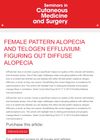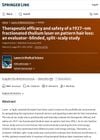44 citations,
January 2004 in “American journal of clinical dermatology” Understanding genetic mutations helps diagnose and treat skin disorders like ichthyosis.
43 citations,
November 2012 in “Pharmaceutical research” Fractional CO2 laser treatment significantly boosts drug and nanoparticle skin absorption, especially through hair follicles.
34 citations,
April 2012 in “Molecular Biology Reports” The enzyme from Bacillus cereus can be used in detergents and leather processing.
 33 citations,
July 2021 in “Clinical, Cosmetic and Investigational Dermatology”
33 citations,
July 2021 in “Clinical, Cosmetic and Investigational Dermatology” Nanocarrier technology in cosmetics improves ingredient delivery and effectiveness while reducing side effects.
33 citations,
June 1995 in “International journal of legal medicine” Environmental factors can greatly reduce drug levels in hair.
32 citations,
May 2017 in “Lasers in medical science” Radiofrequency treatment helps rejuvenate skin by boosting collagen and blood vessel growth.
 27 citations,
May 2019 in “American Journal of Clinical Dermatology”
27 citations,
May 2019 in “American Journal of Clinical Dermatology” Antiandrogen therapy for hidradenitis suppurativa lacks strong evidence and needs more research.
26 citations,
March 2017 in “Aesthetic plastic surgery” Accidental injection of hyaluronic acid caused temporary hair loss and skin damage, but treatment restored hair and healed the skin.
26 citations,
July 2012 in “Journal of family planning and reproductive health care” The document says that hirsutism in women usually needs hair removal and hormone treatment to manage symptoms and improve well-being.
26 citations,
October 2011 in “Biological trace element research” Low copper levels might cause premature graying of hair.
 25 citations,
June 2015 in “Seminars in Cutaneous Medicine and Surgery”
25 citations,
June 2015 in “Seminars in Cutaneous Medicine and Surgery” The article explains how to tell apart and treat two common causes of hair loss in women.
24 citations,
January 2013 in “Lasers in medical science” The fractional ultrapulse CO2 laser is a safe and effective non-surgical treatment for upper eyelid issues and brow lifting.
24 citations,
March 2009 in “Archives of dermatological research” The combination of oral PUVA and corticosteroids helps regrow hair in severe alopecia areata.
23 citations,
September 2016 in “Archives of Dermatological Research” Vitamin D levels do not affect the risk of developing alopecia areata.
23 citations,
September 1992 in “Archives of Dermatological Research” Cepharanthine and minoxidil promote cell growth and delay hair cell maturation.
22 citations,
March 2007 in “European journal of pediatrics” Certain types of mucopolysaccharidoses cause significant hair abnormalities.
 21 citations,
January 2018 in “Lasers in Medical Science”
21 citations,
January 2018 in “Lasers in Medical Science” The 1927-nm fractionated thulium laser treatment significantly improves hair thickness and count in pattern hair loss patients.
21 citations,
June 2009 in “Mammalian genome” A new mutation in the Hr gene causes hair loss in mice, similar to a human hair disorder.
20 citations,
June 2019 in “Archives of dermatological research” Combining DPCP and anthralin helps regrow hair in some alopecia areata patients.
20 citations,
January 2017 in “Genetica” The methylation of the HOXC8 gene's exon 1 affects cashmere fiber length in goats.
20 citations,
June 2014 in “Pharmaceutical research” Using both hyaluronic acid compounds together improves skin hydration and reduces wrinkles better than using one alone.
20 citations,
February 1994 in “In vitro cellular & developmental biology. Animal” Wool follicles can grow in a lab with the right nutrients and conditions.
19 citations,
August 2017 in “American journal of clinical dermatology” Hepatitis B virus exposure may be linked to increased risk of alopecia areata.
18 citations,
November 2016 in “Transgenic research” Overexpressing Tβ4 in cashmere goats improves hair fiber traits and increases cashmere yield.
18 citations,
July 2016 in “Genetica” BMP4 gene is crucial for hair follicle development in Liaoning cashmere goats.
18 citations,
January 2015 in “Journal of medical genetics” New genes linked to woolly hair have been found, which could help treat it and change hair texture.
18 citations,
August 2012 in “Chinese journal of integrative medicine/Chinese Journal of Integrative Medicine” Both treatments for alopecia areata are equally effective and safe.
18 citations,
November 2009 in “Calcified tissue international” A genetic mutation caused severe rickets and alopecia in an Indian patient, but high-dose calcium and phosphate treatment improved their condition.
18 citations,
January 1976 in “Drugs” New treatments improved blood pressure control in patients with resistant hypertension.
17 citations,
February 1987 in “Journal of the American Academy of Dermatology” The hair cuticle acts as a barrier against fungal infection, which occurs only deep within the hair follicle.



